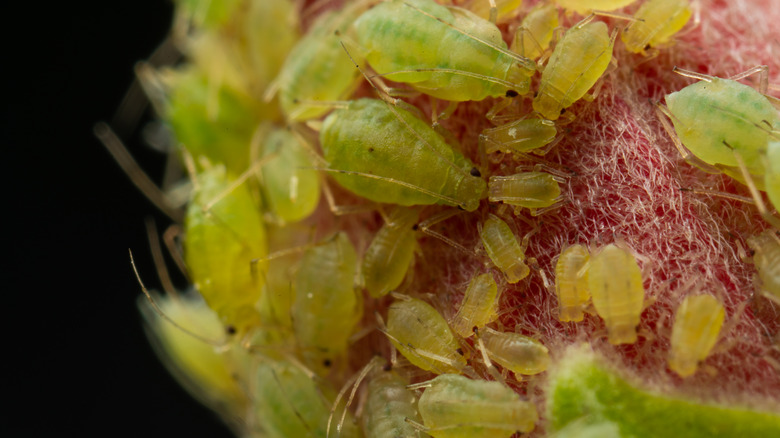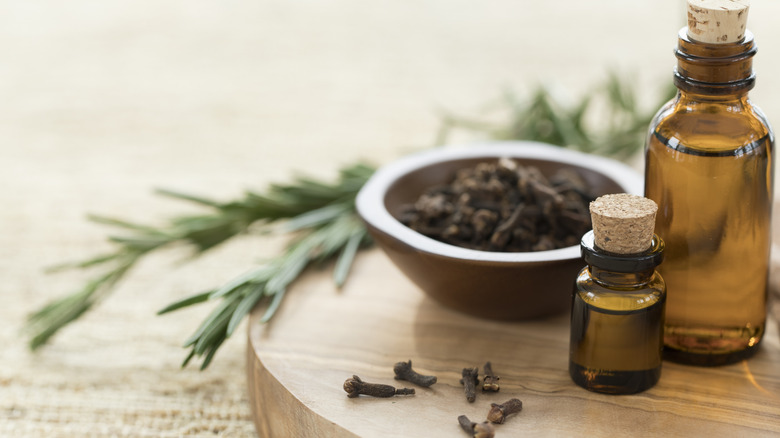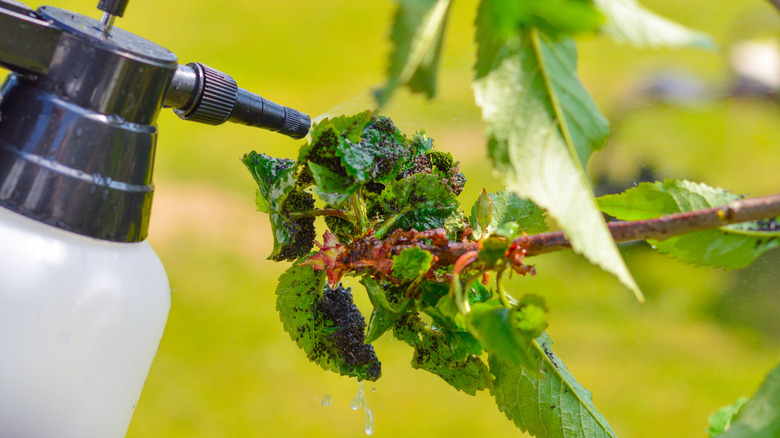Rid Your Garden Of Aphids With An Easy Essential Oil Solution
When you think of essential oils, self-care probably comes to mind first — use a few drops in a relaxing bath or as part of a soothing massage. Or you may be a skeptic who doubts any powers essential oils supposedly have, either for health or beyond. Well, there is reason to believe that a few essences can be used outside of the bath. Some convincing scientific findings have supported using essential oils like clove and peppermint in the fight to get rid of aphids.
Aphids do more than just make our carefully tended plants look ugly. They can pass viruses from plant to plant, cause root damage, and stunt growth. Once you see curling leaves, sticky goo, dark mold, or just the bugs themselves, act quickly to prevent these pests from spreading further. Among the natural aphid solutions, like neem oil sprays or sprinkles of diatomaceous earth, some essential oils can act as well-tested pest repellents or genuine pesticides. What's more, some of these oils have aromas you might actually want lingering around you. The next time you see those nasty little bugs teeming on your precious plants, give a combo of appealingly scented essential oils a try.
Which essential oils fight aphids, and how do they do it?
Take on tenacious aphids with a selection of oils that are either sweet, herbal, or floral. Plus, they can go solo or take on aphids as a team. To help choose and use the right essential oils to keep aphids at bay, Dr. David Grimaldi, entomologist at the American Museum of Natural History in New York City, singles out several essential oils for their abilities to repel or even kill aphids.
According to Grimaldi, people have been tapping into peppermint oil's pest-repelling powers for centuries. Its pungent, even stinging scent can stave off other pests, as well. Grimaldi also endorses lavender, palmarosa, anise, rosemary, and orange to send aphids scurrying due to their overwhelming aromas. Other oils that deserve honorable mention are basil, pennyroyal, lemon, cedarwood, citronella, and eucalyptus.
Take pest fighting a step further with clove essential oil. This strong-scented oil reportedly killed aphids in a study conducted by a group of international scientists and published by Science of the Total Environment. However, the study doesn't share the concentration of oil they used.
Mix up and use an anti-aphid oil spray
Dr. Grimaldi's go-to formula relies on nothing more than peppermint oil and water. Repel bugs naturally by spraying a combination of 10 to 15 drops of oil per ounce of water; this can be used near the plant as an extra-concentrated repellent, but it's likely too strong to apply directly to plants. A formula that some farmers find effective is 10 drops of either peppermint or rosemary essential oil to 1 quart of water. Mix in a spray bottle, and spray directly on plants. Grimaldi's recipe is more concentrated, at 4 to 5 drops of any one (or a combination) of the oils listed above with 1 cup of water. Make sure to reapply the spray every five to seven days.
A DIY spray made of oils and water is easy to mix up, but it's important to pay attention to the proportions of the ingredients. Peppermint oil sprays can damage young plants and leafy greens like spinach and lettuce. It's always wise to test your essential oil remedies on a small area of each plant type, no matter the combination of oils, before subjecting an entire plant to the spray.


